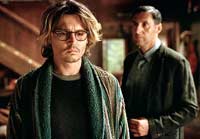 |
They say writers should write about what they know best, and for Stephen King, that has often meant writing stories about writers, and so far—in movies like The Shining, Misery and arguably even Stand By Me—filmmakers have had remarkable success bringing these stories to the big screen. Secret Window, based on a novella that appeared in King’s anthology Four Past Midnight, falls into the same basic category as those stories, but it is not in their league, partly because it forgets what King’s story is really all about.
The film is written and directed by David Koepp, a screenwriter who has parlayed his success with the Jurassic Park and Spider-Man franchises into occasional directing jobs on thrillers like Stir of Echoes, a decent but not spectacular ghost story that had the bad luck to come out right after The Sixth Sense had cornered the market on such tales. In Secret Window, Koepp follows King’s story very closely, but he shuffles a few scenes around, and he completely changes the ending, so that a story about the almost mystical power of writing becomes a somewhat predictable film about a divorce that goes very badly.

King’s story begins with an accusation of plagiarism. Mort Rainey (Johnny Depp), a best-selling author recently separated from his wife, is woken from his sleep in his isolated cabin by a stranger named John Shooter (John Turturro), a drawling Southerner with an uncomfortably precise stare and an Amish hat, who claims that Mort stole his story.
Mort insists that he did not steal Shooter’s story—indeed, it turns out Mort’s story was published in a magazine a couple years before Shooter claims to have written his own story. But Shooter refuses to believe that Mort is innocent until he can produce the magazine—and all of Mort’s efforts to find a copy are thwarted, and in a most extreme manner. Houses are burned down, mail is tampered with, and pets and people are killed horribly.
And lingering over everything is the supernatural possibility that Shooter, psychotic though he may be, just might be telling the truth when he says he did not copy Mort’s story. In King’s novella, this strange premise becomes an occasion to reflect on what it means to “own” a story, and therefore to “steal” one. Where do writers get their inspiration from? Is it possible that the thing which inspires one writer could inspire another, too? There is also a lurking sense of overdue justice in King’s novella, as Mort recalls the one and only act of plagiarism he ever committed, long ago when his career was just getting started.

Koepp’s film begins slightly differently, and it largely suppresses these themes or loses them altogether. First, he shows us the moment when Mort discovers his wife Amy (Maria Bello) in a motel bed with a lover named Ted (Timothy Hutton). Then, as the opening credits unfold, Koepp’s camera glides over a lake toward Mort’s cabin, flies through the titular window, and then passes into a mirror reflection of Mort sleeping on his couch. Already, anyone who remembers the Green Goblin’s conversation with his own mirror image in Spider-Man may be able to guess where the film is going to go from here.
Some of Koepp’s tweaks to the story do work. His film has more humour, though much of it is, admittedly, at the expense of the Hutton character, who has a habit of inadvertently banging his fist into things—details like these make it easier for us to accept Mort’s casual contempt for Ted, to say nothing of the fate that awaits him. But Depp is also quite good at conveying his character’s bitterness over his wife’s infidelity, as well as his bemused realization that his paranoia is making him do some crazy things. Koepp also throws in a few striking visuals, such as a nightmare in which Mort’s couch is suspended over a waterfall.

But ultimately, the film just falls flat. This is partly because Turturro, who can sink his teeth into a bizarre role when he really needs to, is given so little to do with his one-note villain—Shooter is even more of a cipher onscreen than he is in print—and partly because Koepp dosn’t give us much to think about, either thematically or even just in terms of trying to guess what will happen next; the plot presents the audience with a few simple puzzles, but they aren’t that hard to solve, and once they are, we’re not left with a desire to figure out what any of it might mean. Even the Philip Glass music sounds unmemorably humdrum. This is, in short, a mystery story that has very little actual mystery.
Talk About It
Discussion starters- Where do you think artists and storytellers get their inspiration? Do stories belong to storytellers, to the people who hear the stories, or to someone else? Is it a form of “theft” to profit off of an idea? What if you believe the idea ultimately comes from God?
- How do you think Mort should have responded when he discovered his wife was having an affair? Is there a better way he could have handled this? How? What about Amy’s comment that he was too wrapped up in his work?
- Is it healthy to talk to yourself, as Mort often does? How is this different from prayer? How is it the same?
The Family Corner
For parents to considerThe film begins with a man discovering his wife in bed with another man, but there is no nudity. A dog and a few people are killed with screwdrivers and shovels, and there is some blood, but most of the violence is discovered after the fact or kept off-screen. The characters make regular but not-too-frequent use of certain mild profanities.
What Other Critics Are Saying
compiled by Jeffrey Overstreetfrom Film Forum, 03/18/04Stephen King has written several horror stories about writers (The Shining, Misery), and adaptations of these stories have given some of Hollywood’s finest actors opportunities to do excellent work. With the release of Secret Window, critics are applauding the performance of Johnny Depp as a writer wrestling with personal demons.
While most mainstream critics are quick to point out that this is not one of King’s best works, some religious press critics are finding some valuable lessons in the story. “Depp is the best actor in Hollywood,” says Annabelle Robertson (Crosswalk), “and his performance … is positively inspired.” She adds that the film shows “that evil is not only frighteningly real, but something that must be avoided at all cost. The film also demonstrates the high cost of marital infidelity and the kind of evil that can be unleashed when we choose to follow our sinful desires.”
Jeff Diaz (The Film Forum) says, “The plotline is a variation on the common ‘your-sins-will-find-you-out’ theme with a not too inspired twist. Therefore at times it feels like a well-worn coat … comfortable but rather shabby. And being that it is a well-worn plot you figure out the end way before you need to … hence leaving you with watching the inevitable happen like a slow train coming down the tracks.”
Speaking to the quality of the filmmaking, Peter T. Chattaway (Christianity Today Movies) says Secret Window “falls flat. The plot presents the audience with a few simple puzzles, but they aren’t that hard to solve, and once they are, we’re not left with a desire to figure out what any of it might mean.”
Eddie Turner (Movieguide) agrees that the film is “undercooked and will give you little for a two-hour investment.”
But David DiCerto (Catholic News Service) says the movie is “tautly paced with enough hair-raising suspense to keep viewers’ cold sweat on a slow drip. [It] owes more of its pedigree to the works of Hitchcock than to contemporary slasher flicks.”
Michael Elliott (Movie Parables) argues, “Secret Window is not a bad film, but it isn’t necessarily a great one. Depp’s characterization is worth a look—as is [John] Turturro’s. But overall, the twists of the film are a bit obvious.” He says the story “has to do with what we choose to do with our minds. We can dwell on the hurt and pain that we have experienced in the past or we can choose to look towards the future which holds the promise of a life yet to come.”
Sherri McMurray (Christian Spotlight) is bothered by “gore and many disturbing, un-Christian themes throughout.” But the themes that she highlight seem quite Christian indeed: “This is a film that deals with the power Satan has in inflicting depression caused by sin and then turning it into mental illness. If he can catch a soul at this most vulnerable time, the devil feels he has won a small victory.” She concludes by rejecting the film for its “references to adulterous sex, the themes of alcohol abuse, loose morals, strong language, and graphic visions of murder,” which she says “will be extremely offensive to most Christians.”
If the film shows a character making evil choices, and then shows the consequences, why should that be offensive to Christians? If it portrays the damage that alcohol abuse can achieve, should we not call it truthful?
David Bruce (Hollywood Jesus) addresses that very point in his review. He says Depp’s character “provides us with a powerful metaphor of the human dilemma. Each of us determines, in a substantial way, the ending of our own story, whether we want to think so or not. And, each of us contributes to the life stories of others. We are all responsible for the outcome of our lives and for the lives of those that surround us.”
from Film Forum, 03/25/04Reviewing last week’s hit horror flick Secret Window, Josh Hurst (Relevant) says Johnny Depp “deserves major kudos for turning what would have been a forgettable, half-hearted thriller, into something surprisingly entertaining. Special effects and extreme stunts can’t save a film with a bad script, but, if Secret Window is any indication, sometimes a great cast can.”
Copyright © 2004 Christianity Today. Click for reprint information.











